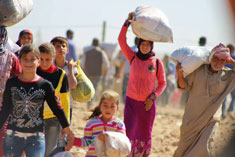-
The Global Refugee Crisis Has Coarsened Our Politics, Says Wilson Fellow Joseph Cassidy
November 18, 2016 By Abraham Tall Chaotic flows of refugees and migrants – the most since World War II – have challenged leaders in Western Europe and North America. “The reactions to those big flows are undermining our institutions in important ways and degrading our politics,” says Wilson Center Fellow Joseph Cassidy in this week’s podcast.
Chaotic flows of refugees and migrants – the most since World War II – have challenged leaders in Western Europe and North America. “The reactions to those big flows are undermining our institutions in important ways and degrading our politics,” says Wilson Center Fellow Joseph Cassidy in this week’s podcast.Chaotic flows of refugees and migrants – the most since World War II – have challenged leaders in Western Europe and North America. “The reactions to those big flows are undermining our institutions in important ways and degrading our politics,” says Wilson Center Fellow Joseph Cassidy in this week’s podcast.
Before joining the Wilson Center this summer, Cassidy spent 25 years in the U.S. Department of State focusing on humanitarian and human rights issues and multilateral diplomacy. In a Wilson Council briefing taped before the close of the U.S. presidential election, Roger-Mark De Souza, director of population, environmental security, and resilience, talks with Cassidy about current humanitarian challenges.
The inability of governments and institutions to effectively cope with the influx of displaced peoples has caused the politicization of what was once a bipartisan issue, says Cassidy. We have seen “the rise of demagogues who have identified refugees and other migrants as people worth resenting and fearing.” As a result, it has “coarsened” our politics.
Anti-immigrant sentiment is not new, but Cassidy says it can be “mitigated by smart policies and principled politicians, [or] it can be exaggerated by bad policies and unprincipled politicians.”
We have seen “the rise of demagogues who have identified refugees and other migrants as people worth resenting”Part of the problem is an aging legal regime that needs updating. The UN Refugee Convention was adopted in 1951. The nature of conflicts has changed, as have the armed groups involved, the extent to which civilians are targeted, and the opportunities for victims to flee. Additionally, the Refugee Convention does not provide legal protections to particularly vulnerable groups that any modern negotiations would address, says Cassidy, namely women, children, indigenous people, LGBT individuals, or the disabled. Nor is climate change considered.
However, many experts are concerned that re-opening the Refugee Convention in the current atmosphere of anti-immigrant sentiment would degrade the existing rights of victims, such as they are, and reduce the responsibilities of states. While acknowledging the risks, Cassidy noted there are numerous other frameworks to influence state behavior, including, international guidelines, regional arrangements, and national laws.
According to the United Nations High Commission on Refugees, there are three main reasons for the current increase in refugee populations: 1) protracted conflicts, 2) an increased frequency in the prevalence of conflicts, and 3) a decreased capacity to accommodate refugees and internally displaced individuals.
To reduce the number of displaced people and ultimately the pressure on Western institutions and politics, Cassidy believes “we we need to smooth the transition from humanitarian assistance to development assistance” and bring the two fields closer together. Many humanitarians worry development workers don’t take protection seriously enough, while development workers worry humanitarians do not think long term.
Asked about his expectations for the tenure of new UN Secretary-General António Guterres, Cassidy noted five major questions to watch. Humanitarians are excited to have a long-time high commissioner for refugees at the helm, someone who is “well respected for his competence and his principles,” he says. The international community, in general, does not do enough to “identify…enhance…and utilize refugee value.” Guterres may help change this, bringing attention to refugee conditions and humanitarian needs.
In September, the United Nations hosted two summits, the first of which launched a two-year negotiation aimed at addressing outstanding humanitarian problems, and the second of which collected pledges to increase humanitarian funding, refugee resettlement, and education and occupational opportunities. During his fellowship, Cassidy will be watching these processes closely and engaging with colleagues in related fields like environmental protection, economic migration, and conflict resolution.
Joseph Cassidy spoke during a Wilson Council briefing on November 1, 2016.
Friday Podcasts are also available for download on iTunes and Google Podcasts.
Sources: United Nations High Commission on Refugees.
Cover Photo: Syrian refugees in Turkey, courtesy of EC/ECHO.
 A Publication of the Stimson Center.
A Publication of the Stimson Center.

 Chaotic flows of refugees and migrants – the most since World War II – have challenged leaders in Western Europe and North America. “The reactions to those big flows are undermining our institutions in important ways and degrading our politics,” says Wilson Center Fellow
Chaotic flows of refugees and migrants – the most since World War II – have challenged leaders in Western Europe and North America. “The reactions to those big flows are undermining our institutions in important ways and degrading our politics,” says Wilson Center Fellow 

